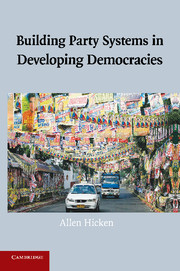Book contents
- Frontmatter
- Contents
- Acknowledgments
- Building Party Systems in Developing Democracies
- 1 Introduction
- 2 A Theory of Aggregation Incentives
- 3 Testing the Theory
- 4 Aggregation, Nationalization, and the Number of Parties in Thailand
- 5 Explaining Aggregation in Thailand
- 6 Term Limits, Aggregation Incentives, and the Number of Parties in the Philippines
- 7 Conclusion
- References
- Index
5 - Explaining Aggregation in Thailand
Published online by Cambridge University Press: 29 July 2009
- Frontmatter
- Contents
- Acknowledgments
- Building Party Systems in Developing Democracies
- 1 Introduction
- 2 A Theory of Aggregation Incentives
- 3 Testing the Theory
- 4 Aggregation, Nationalization, and the Number of Parties in Thailand
- 5 Explaining Aggregation in Thailand
- 6 Term Limits, Aggregation Incentives, and the Number of Parties in the Philippines
- 7 Conclusion
- References
- Index
Summary
INTRODUCTION
What does the theory of aggregation incentives as described in Chapter 2 tell us about the roots of cross-district coordination failures in pre-1997 Thailand? Why was aggregation so poor? Drawing on the theory presented in Chapter 2, I argue that poor aggregation incentives in Thailand reflected a diffusion of power within the national government (due to party factionalism and an appointed Senate) and uncertainty over the procedure for selecting the prime minister. In short, the expected utility associated with being the largest party in parliament was relatively low in pre-1997 Thailand. This discouraged greater attempts at cross-district coordination. I also discuss and evaluate possible alternative explanations (i.e., social heterogeneity and regionalism). I then devote the rest of the chapter to analyzing the effects of constitutional reform in light of the theory. Since the new Thai constitution and electoral system adopted in 1997 altered some of the variables I claim help shape aggregation incentives, this episode of institutional reform is an ideal opportunity for the use of comparative statics. In short, the constitutional reforms present me with a natural experiment that I can use to test the predictive power of the theory. The theory helps explain how and why the Thai party system has changed since the constitutional reforms. Specifically, I show that improvements in the aggregation payoff resulting primarily from new tools to combat party factionalism contributed to a dramatic improvement in cross-district coordination and an accompanying fall in the effective number of electoral parties.
Information
- Type
- Chapter
- Information
- Building Party Systems in Developing Democracies , pp. 116 - 148Publisher: Cambridge University PressPrint publication year: 2009
